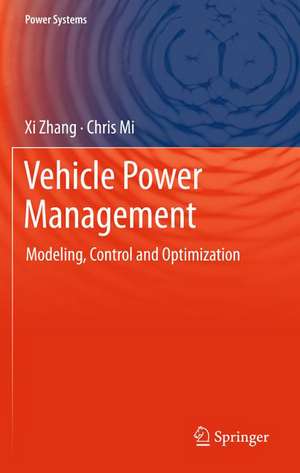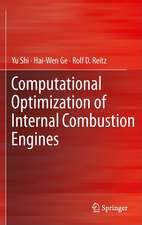Vehicle Power Management: Modeling, Control and Optimization: Power Systems
Autor XI Zhang, Chris Mien Limba Engleză Hardback – 12 aug 2011
Specific vehicle power management algorithms and strategies, including the analytical approach, optimal control, intelligent system approaches and wavelet technology, are derived and analyzed for realistic applications. Vehicle Power Management also gives a detailed description of several key technologies in the design phases of hybrid electric vehicles containing battery management systems, component optimization, hardware-in-the-loop and software-in-the-loop.
Vehicle Power Management provides graduate and upper level undergraduate students, engineers, and researchers in both academia and the automotive industry, with a clear understanding of the concepts, methodologies, and prospects of vehicle power management.
| Toate formatele și edițiile | Preț | Express |
|---|---|---|
| Paperback (1) | 1377.92 lei 6-8 săpt. | |
| SPRINGER LONDON – 27 noi 2013 | 1377.92 lei 6-8 săpt. | |
| Hardback (1) | 1380.78 lei 6-8 săpt. | |
| SPRINGER LONDON – 12 aug 2011 | 1380.78 lei 6-8 săpt. |
Din seria Power Systems
- 18%
 Preț: 953.13 lei
Preț: 953.13 lei - 18%
 Preț: 783.98 lei
Preț: 783.98 lei - 20%
 Preț: 1002.48 lei
Preț: 1002.48 lei - 18%
 Preț: 1021.86 lei
Preț: 1021.86 lei - 18%
 Preț: 897.65 lei
Preț: 897.65 lei - 18%
 Preț: 788.72 lei
Preț: 788.72 lei - 18%
 Preț: 734.27 lei
Preț: 734.27 lei - 18%
 Preț: 902.36 lei
Preț: 902.36 lei -
 Preț: 563.51 lei
Preț: 563.51 lei - 18%
 Preț: 955.08 lei
Preț: 955.08 lei - 18%
 Preț: 946.87 lei
Preț: 946.87 lei - 18%
 Preț: 950.52 lei
Preț: 950.52 lei - 18%
 Preț: 949.23 lei
Preț: 949.23 lei - 15%
 Preț: 641.85 lei
Preț: 641.85 lei - 18%
 Preț: 1116.26 lei
Preț: 1116.26 lei - 18%
 Preț: 961.10 lei
Preț: 961.10 lei - 15%
 Preț: 639.59 lei
Preț: 639.59 lei - 15%
 Preț: 641.03 lei
Preț: 641.03 lei - 18%
 Preț: 2497.51 lei
Preț: 2497.51 lei - 18%
 Preț: 957.62 lei
Preț: 957.62 lei - 18%
 Preț: 1229.91 lei
Preț: 1229.91 lei - 15%
 Preț: 643.34 lei
Preț: 643.34 lei - 18%
 Preț: 957.09 lei
Preț: 957.09 lei - 18%
 Preț: 1231.47 lei
Preț: 1231.47 lei - 15%
 Preț: 698.30 lei
Preț: 698.30 lei - 18%
 Preț: 953.20 lei
Preț: 953.20 lei - 15%
 Preț: 640.88 lei
Preț: 640.88 lei - 15%
 Preț: 634.18 lei
Preț: 634.18 lei - 18%
 Preț: 955.08 lei
Preț: 955.08 lei - 18%
 Preț: 1241.73 lei
Preț: 1241.73 lei - 18%
 Preț: 952.09 lei
Preț: 952.09 lei - 18%
 Preț: 946.55 lei
Preț: 946.55 lei - 18%
 Preț: 961.86 lei
Preț: 961.86 lei - 18%
 Preț: 944.19 lei
Preț: 944.19 lei - 18%
 Preț: 1110.72 lei
Preț: 1110.72 lei - 15%
 Preț: 642.03 lei
Preț: 642.03 lei - 15%
 Preț: 636.12 lei
Preț: 636.12 lei - 18%
 Preț: 1054.99 lei
Preț: 1054.99 lei - 15%
 Preț: 639.90 lei
Preț: 639.90 lei - 18%
 Preț: 957.32 lei
Preț: 957.32 lei - 18%
 Preț: 1235.57 lei
Preț: 1235.57 lei - 18%
 Preț: 959.19 lei
Preț: 959.19 lei
Preț: 1380.78 lei
Preț vechi: 1683.87 lei
-18% Nou
Puncte Express: 2071
Preț estimativ în valută:
264.30€ • 287.18$ • 222.15£
264.30€ • 287.18$ • 222.15£
Carte tipărită la comandă
Livrare economică 22 aprilie-06 mai
Preluare comenzi: 021 569.72.76
Specificații
ISBN-13: 9780857297358
ISBN-10: 085729735X
Pagini: 346
Ilustrații: XIV, 346 p.
Dimensiuni: 155 x 235 x 23 mm
Greutate: 0.59 kg
Ediția:2011
Editura: SPRINGER LONDON
Colecția Springer
Seria Power Systems
Locul publicării:London, United Kingdom
ISBN-10: 085729735X
Pagini: 346
Ilustrații: XIV, 346 p.
Dimensiuni: 155 x 235 x 23 mm
Greutate: 0.59 kg
Ediția:2011
Editura: SPRINGER LONDON
Colecția Springer
Seria Power Systems
Locul publicării:London, United Kingdom
Public țintă
ResearchCuprins
1. Introduction.- 2. Basics of Vehicle Power Management.- 3. Modeling.- 4. Analytical Approach.- 5. Wavelet Technology.- 6. Dynamic and Quadratic Programming.- 7. Intelligent System Approach.- 8. ESS Management.- 9. Component Optimization.- 10. Hardware in the Loop.- 11. Future Trends in Vehicle Power Management.
Notă biografică
Chris Mi is Associate Professor of Electrical and Computer Engineering at the University of Michigan-Dearborn. His research interests are in power electronics, motor drives, electric and hybrid vehicles, and renewable energy systems. Dr. Mi holds a BSc and an MSc degree from Northwestern Polytechnical University, Xi’an, China, and a PhD degree from the University of Toronto, Toronto, Canada.
Xi Zhang received BSc, MSc and PhD degrees in Electrical Engineering from Shanghai Jiaotong University, Shanghai, China, in 2002, 2004 and 2007 respectively. He joined the University of Michigan-Dearborn in September 2007 as a post-doctoral researcher. His research interests are in the power management of hybrid electric vehicles and power electronics.
Xi Zhang received BSc, MSc and PhD degrees in Electrical Engineering from Shanghai Jiaotong University, Shanghai, China, in 2002, 2004 and 2007 respectively. He joined the University of Michigan-Dearborn in September 2007 as a post-doctoral researcher. His research interests are in the power management of hybrid electric vehicles and power electronics.
Textul de pe ultima copertă
Vehicle Power Management addresses the challenge of improving vehicle fuel economy and reducing emissions without sacrificing vehicle performance, reliability and durability. It opens with the definition, objectives, and current research issues of vehicle power management, before moving on to a detailed introduction to the modeling of vehicle devices and components involved in the vehicle power management system, which has been proven to be the most cost-effective and efficient method for initial-phase vehicle research and design.
Specific vehicle power management algorithms and strategies, including the analytical approach, optimal control, intelligent system approaches and wavelet technology, are derived and analyzed for realistic applications. Vehicle Power Management also gives a detailed description of several key technologies in the design phases of hybrid electric vehicles containing battery management systems, component optimization, hardware-in-the-loop and software-in-the-loop.
Vehicle Power Management provides graduate and upper level undergraduate students, engineers, and researchers in both academia and the automotive industry, with a clear understanding of the concepts, methodologies, and prospects of vehicle power management.
Specific vehicle power management algorithms and strategies, including the analytical approach, optimal control, intelligent system approaches and wavelet technology, are derived and analyzed for realistic applications. Vehicle Power Management also gives a detailed description of several key technologies in the design phases of hybrid electric vehicles containing battery management systems, component optimization, hardware-in-the-loop and software-in-the-loop.
Vehicle Power Management provides graduate and upper level undergraduate students, engineers, and researchers in both academia and the automotive industry, with a clear understanding of the concepts, methodologies, and prospects of vehicle power management.
Caracteristici
Brings together the concepts, purposes, methodologies and prospects for vehicle power management Introduces readers to new concepts of vehicle design aimed at improving fuel economy and reducing emissions Gives a detailed description of several key technologies in the design phases of hybrid electric vehicles

















